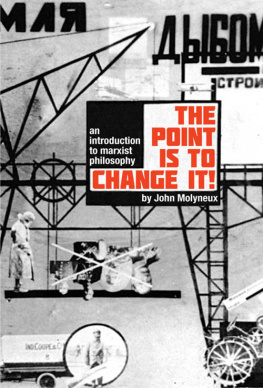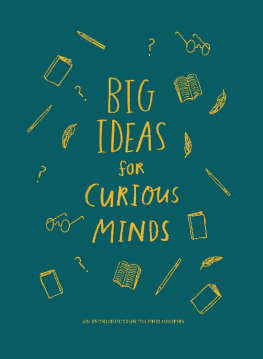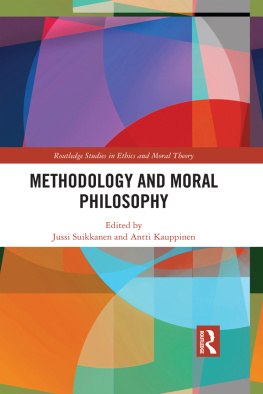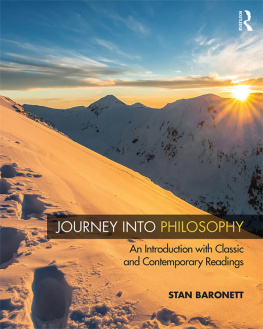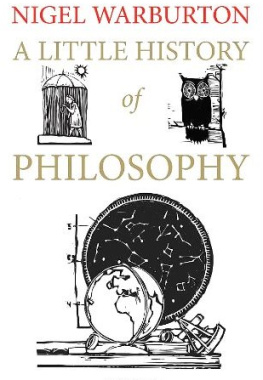(Back Cover)
Essential Philosophy
Contents
Introduction
Everything you do is philosophical.
You wake in the morning, groan, stretch and open your eyes. What is happening?
Everything that is happening is philosophical .
How do you know you are awake? How do you know it is morning? How do you know your eyes are open? How do you know your dreaming has ended and your day has begun?
How do you know your memories of yesterday or ten years ago are valid? How do you even know you are the same person as the one who got into bed last night?
It gets even crazier, when you really think about it.
How do you know that your experience is not in fact some elaborate simulation? Do you know for certain that you are not a brain in a tank, wired up to some Matrix-style virtual reality?
Look at your hand right now. You see a hand, sure, but how do you know that the hand truly exists outside of your mind? Sure, you see your hand, but the image only shows up in your mind. Its the same with your sensations of your hand they also only show up in your mind. Where is the hand itself?
Last night, in your dreams, you also had hands or claws, or tentacles, or heaven knows what that did not exist or move in what you call the real world. In your dreams, you visited a floating island full of dragons that does not exist outside your dreamscape or does it? Perhaps your dreams are the real world, and your waking life is the dream. How can you know for certain?
Perhaps the people you live with are mere avatars artificial intelligence simulations of human beings. Perhaps they were all real people at some point, but have been replaced by space aliens with perfect biological robots. When you went to a movie last night, perhaps the entire cinema complex was a form of elaborate theatre perhaps you were in a movie, watching a movie.
What if you are created anew every day from scratch, but with a steady if inconsistent series of progressive memories layered into your newly hatched brain?
What about your memory?
Is it real? Recalled events are gone, lost in time; your memory only exists in your mind. What if you or something else is altering it over time?
Think of your very first memory is it real? Think of other early memories could they have been created in your mind by stories you heard as a child?
Try this on for size: go and visit your childhood neighbourhood. I guarantee you that it will neither look nor feel exactly as you remember it and sometimes not even approximately, even if little has changed.
Look at a picture of yourself as a child where has that child gone? When you build a foundation for a house, the finished house still has that foundation. But what still remains of your childhood body and mind? You are not like some Russian doll with smaller versions of yourself remaining inside. The human body is replaced over time every seven years, with little to nothing left from your past physical self. Where are your memories? Are your memories like the childhood game of Broken Telephone, irretrievably lost in endless translation?
Invite childhood friends and siblings over for dinner and discuss shared past events what perceptions do you all have in common? I guarantee you that others will have very strong memories that significantly differ from yours sometimes even opposing them completely. What does this mean? You were all in the same place, experiencing the same things but you have very different memories. Nothing remains of the events except the memories, the interpretations, and everyones story about the events so tell me, what is real? If everyone has a different idea of what happened, what actually happened? Can anyone tell?
If you have home movies of your childhood, sit down with your family and review them what are the various interpretations of what is objectively happening on the screen? When your sister made fun of you, was it playful ribbing, as she remembers, or was it painful teasing, as you remember? Even recorded objectivity rarely leads to objectivity.
Even if you remember the same events as your siblings, you can each end up with entirely opposing interpretations. A father hits his children one child remembers violent abuse, the other remembers stern but loving discipline. A sister believes it made her a better person, a brother believes it harmed him deeply.
A mother has an affair her daughter sympathizes with her loneliness; her son condemns her as selfish.
You grew up poor you resent it, your brother thinks it built character.
One of your toddlers loves the noisy vacuum cleaner the other screams and flees in terror. Is either interpretation the true nature of the vacuum cleaner? Is it a fun noisemaker, or a terrifying monster?
One mother loves cooking for her family; another resents it as a repetitive chore.
Let us go deeper as we can always go deeper.
Here is another challenge: you claim that you have an identity and that you are your own person, of course but what does that really mean? Let us say that you are a Christian, and you consider your religion a feature of your own personal identity. If at birth you had been adopted by a Zoroastrian family, you would surely have been brought up in that familys religion, and you would now consider being a Zoroastrian part of your own personal identity. If you were brought up in a house of Democrats, or liberals, or leftists, you would likely be more willing to inherit that political perspective.
How much of you is distinct from what you have inherited? If you merely inherited a trait, is it really you?
How much of your personality is largely inherited, genetic, and beyond your capacity to change significantly? How much of yourself do you think you have chosen, earned, built with your own mental bare hands? How often do you condemn other peoples personalities, as if other people somehow magically just chose who they are?
What if your judgmental nature is not completely your choice, but partly genetic?
You say that you are tall or short but height is also a function of your genetics, not your own personal, earned identity. You can take pride in parts of your personality and achievements you may be hard-working or very honest but significant aspects of your personality and achievements are genetic. Your intelligence is largely genetic, your conscientiousness, your level of social comfort, your charisma these largely arise from unchosen biological influences, though we often take personal pride in that which we have biologically inherited.
Do you consider yourself a conservative, liberal, or something else? If you are a male conservative, did you know that trait is 64.5% heritable? For women, it is 44.7%.
To describe yourself, you need language, of course. If English is your native tongue, you possess a unique set of words by which you may describe yourself some of which do not even exist in other languages.
Think of how much of your personal identity, that which you call a self, has been influenced by the work of others writers and moviemakers and actors and singers and teachers and so on.
Your language, your culture, your family, your schooling, some of your accidental exposures to the thoughts and feelings of others all of these influences have shaped you, but they did not originate within you.
Even if you could accurately say, I was influenced by Bob, you have merely moved the chain of causality one step away. Who was Bob influenced by? How many of his capacities and perspectives were chosen? Were you influenced by Bobs thoughts or Bobs genetics? How can the things that influenced you or Bob be accurately separated?


